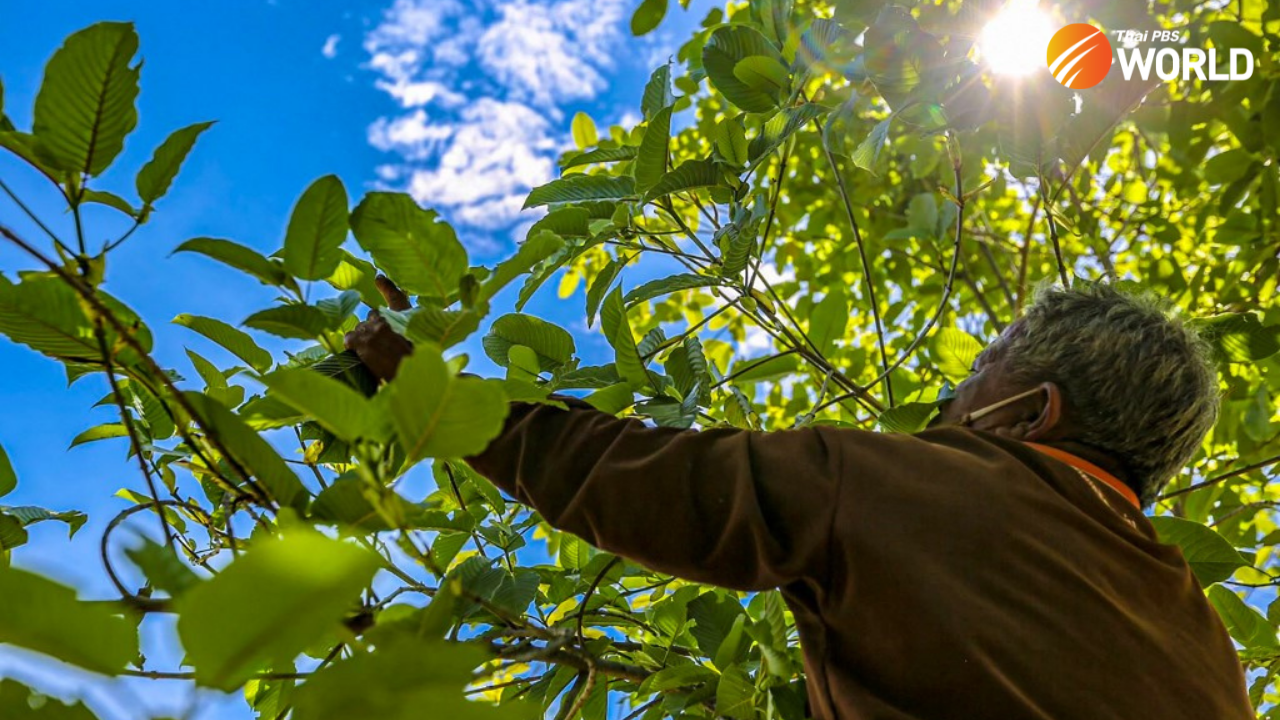The journey of traditional herb kratom – from banned narcotic to legal cash crop

For nearly 80 years, traditional herbal remedy kratom (Mitragyna speciosa) featured on the list of banned substances. But on August 24 it was not only legalized but also became a promising cash crop.
Thai PBS World explores the benefits of this herb, its journey back to legality, and why it was banned for so many decades.
Benefits & harm
Indigenous to Southeast Asia and widespread in the South of Thailand, kratom has been used as a herbal remedy for decades. This evergreen tropical plant is used to treat diarrhea, muscular aches, and insomnia. In bygone days, chewing kratom was popular among Thais as a way of easing anxiety or boosting their energy to work longer hours. Research is now underway on kratom as a treatment for opioid addiction.
However, though kratom’s list of claimed benefits is long and varied, the feeling of euphoria it gives may have been a cause for concern. Overconsumption is also believed to cause nausea, constipation, darkening of the skin, and hallucinations.
Illegal status
Although Thailand’s list of controlled substances dates back to the Ayutthaya period (1350-1767), kratom was only declared illegal in 1943.
Researchers suggest it was targeted for financial reasons. At the time it was banned, Thailand was struggling from the economic fallout of World War II. The government had monopolized the opium market and was seeking to maximize tax revenue from registered opium users. However, most people still preferred the cheaper alternative, kratom. The government calculated that a ban on kratom would force users to opt for the more expensive opium and pay higher taxes.
It should be noted that Thailand was the first country to list kratom as a controlled substance. The 1943 Kratom Act banned the import or export of the herb unless authorized by authorities.
Planting, using, selling, or buying of kratom was also illegal unless officially permitted for medical or scientific purposes. Lawbreakers faced a fine of Bt200 and/or up-to six months in jail.
The herb’s illegal status became even more entrenched when the country passed the Narcotics Act in 1979. Under this act, kratom became a Category 5 drug, alongside cannabis. Though individual users only faced fines of Bt2,000, people caught with more than 10 kilos of the herb with an intent to sell could be hit by a fine of Bt1.5 million and/or up-to 15 years in jail.

Road to legalization
In 2019, the government revised the narcotics law to allow marijuana and kratom to be used for medical purposes. This meant kratom could be used in the form of pills or potions – but consumption in other forms was still a crime.
Kratom was only fully legalized this year after the Narcotics Act was amended again. On August 24, kratom was removed from the list of controlled substances altogether and related legal penalties nullified. Lawmakers argued the move was reasonable because the 1961 Single Convention on Narcotic Drugs and its 1972 Protocol do not define kratom as a narcotic. They also noted that people in many parts of Thailand consume kratom as part of their traditional lifestyle.
What’s next?
All 1,038 inmates behind bars for kratom-related offenses were immediately released, while legal proceedings against 10,000 others were scrapped.
Parliament is expected to pass the Kratom Bill soon too. The Cabinet approved the draft in October 2020, opening the door to the official kratom trade. The bill stipulates that permission needs to be secured from authorities to grow, distribute import, or export kratom for industrial use.
However, sale of kratom to children (under-18s) and pregnant or breastfeeding women will be banned and penalized with a maximum fine of Bt30,000. The mixing of kratom leaves or juice with other illegal substances is punishable by a fine of up to Bt50,000.
However, the law will give the once-banned kratom a new lease of life as a cash crop and a key ingredient in many household products.
By Thai PBS World’s General Desk






